At the week-long National People’s Congress, the focus is shifting from one policy area to the next. After economic policy over the weekend, foreign policy came next on Tuesday. Minister Qin Gang was given ample space to present China’s view of things.
Premier Li still expressed soft tones on Sunday. But yesterday, Qin was all the more wolfish. He did not adopt the hoped-for role as a neutral mediator between the two sides in the Ukraine war. For him, Russia is a victim of Western intrigue. He believes that global stability is best helped by closer relations between Moscow and Beijing.
Here the contradictions in China’s goals once again show. The country wants to present itself as a confident broker. In the overall picture of its interests, however, it wants to preserve a strong Russia as a counterweight to the USA and the EU. Therefore, whenever China has taken a step toward Ukraine, it takes a step back toward Russia. Beijing maintains its closeness to Moscow.
On the occasion of the People’s Congress, we asked two of the most distinguished experts on the inner workings of the Chinese Communist Party about the current state of the party. Sophie Reiss from Merics and Marina Rudyak from the University of Goettingen uncover the hidden vulnerabilities of the system in an interview with Michael Radunski.
Today, Huawei responded to the apparently imminent exclusion of Chinese equipment from Germany’s telecommunications networks. The company is urging politicians to remain level-headed. Network operators such as Telekom and Telefónica, in turn, warn that the switch away from the biggest supplier cannot happen overnight.

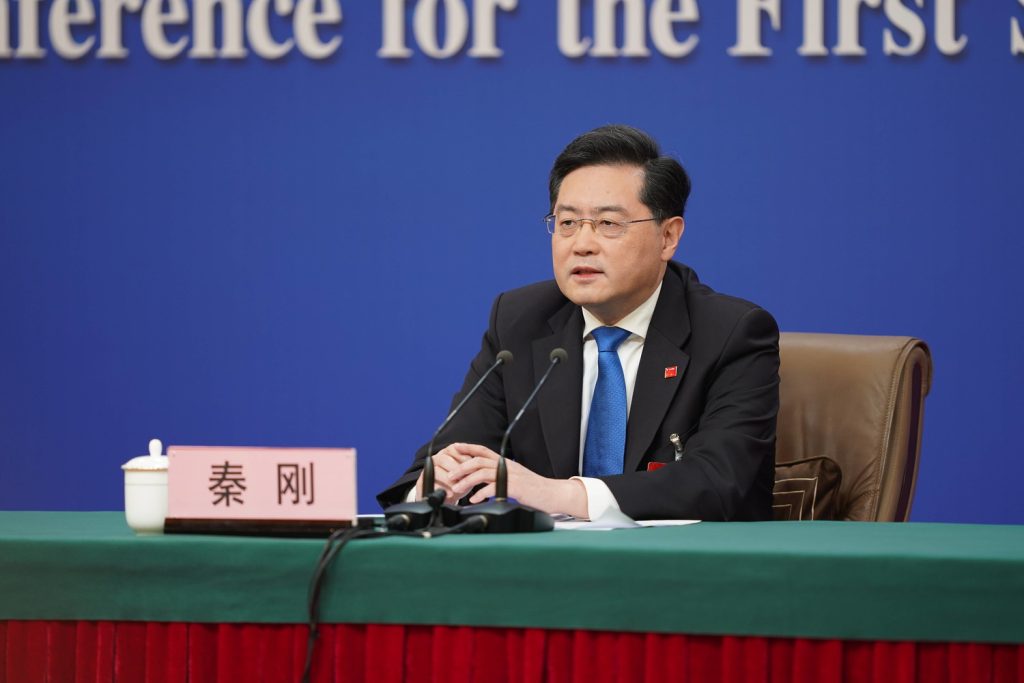
The Chinese Foreign Minister’s big press conference is a regular date in the calendar of the People’s Congress. It could have been a perfect opportunity for Qin Gang to clarify how exactly China envisages its peace initiative for Ukraine. Not much has been heard since Beijing presented its very vague twelve-point paper on the conflict a good fortnight ago.
But Qin let the opportunity pass. It quickly became clear that he wants to set other accents. He sees the blame for the situation, which he still refuses to call a war, in the EU, the USA and NATO. As every year, the event was meticulously orchestrated, with those present reciting questions that they had to submit and coordinate in advance. So first, a compliant journalist asked how China managed to become such a modern country in such a short time.
The second question asked by a foreign media representative came from the Russian news agency Tass. Could China imagine abandoning the US dollar and the euro when trading with Russia? China would use any currency that was “efficient, secure and credible”, the foreign minister replied meaningfully. He immediately added that relations between the two countries were unshakeable. “The more unstable the world becomes, the more imperative it is for China and Russia to steadily advance their relations,” Qin said.
While he did subsequently call again for peace talks, his appeal demanded that the “legitimate security concerns of all parties should be respected”- a formulation that China usually uses to express support for the Russian position. The conflict, he said, essentially stemmed from problems in the European security architecture. Once again, there was no mention of a Russian invasion.
Qin then devoted a large part of his further remarks to what he saw as the real culprit of the crisis: It was regrettable that the efforts for peace talks were repeatedly undermined. “There seems to be ‘an invisible hand’ pushing for the protraction and escalation of the conflict and using the Ukraine crisis to serve certain geopolitical agenda”. This was a reference to the USA.
At the opening of the People’s Congress on Sunday, outgoing Premier Li Keqiang had been reserved in his comments on foreign policy. But now Qin was all the harsher. If the US continues to speed down the wrong path, “no amount of guardrails can prevent derailing, and there will surely be conflict and confrontation“.
Although Washington would talk about competition, it actually wants to suppress China in all areas, he said. Qin compared relations to an unfair Olympic race: “If one athlete, instead of focusing on giving one’s best, always tries to trip or even injure the other, that is not fair competition, but malicious confrontation and a foul,” said the Chinese foreign minister.
He also urged the US to stop interfering in the Taiwan issue and drew a bizarre comparison: “Why does the US talk at length about respecting sovereignty and territorial integrity on Ukraine, while disrespecting China’s sovereignty and territorial integrity on China’s Taiwan question” he asked. Yet another statement that makes it hard to imagine China being a suitable mediator in the Ukraine war.
In the same breath, Qin rejected US insinuations that his country was providing “lethal assistance” to Russia. China “has not provided weapons to either side of the conflict,” he said. “Why is China being suspected and threatened with sanctions? This is unacceptable!” the foreign minister stressed.
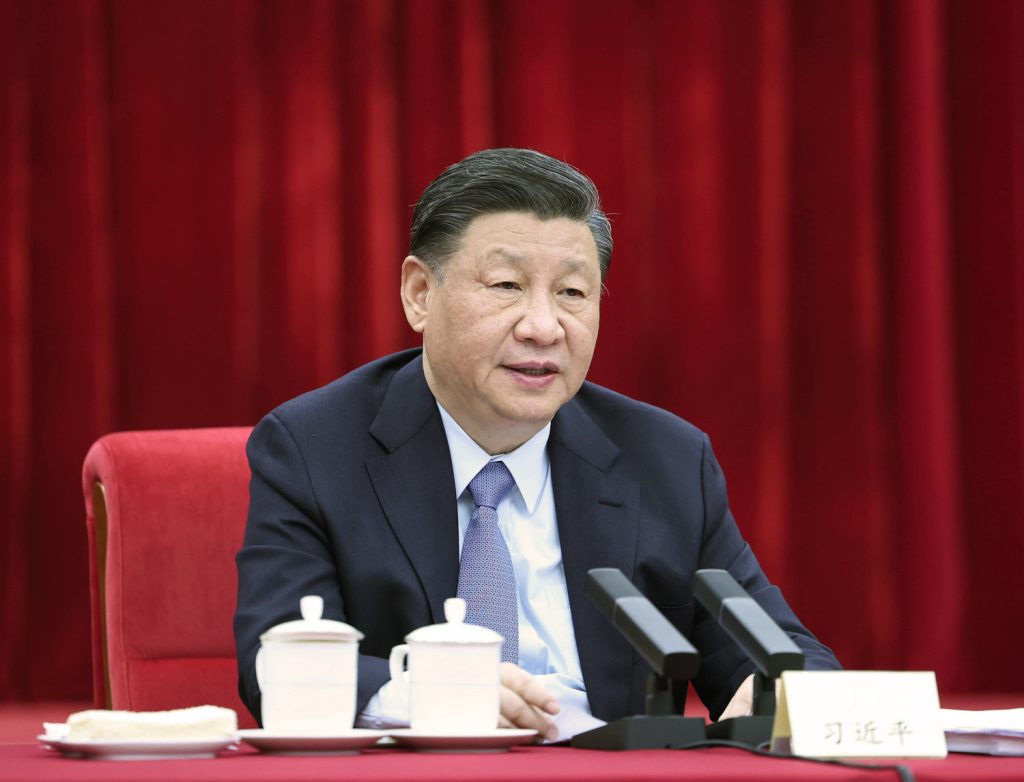
On the grand stage of the National People’s Congress (NPC) in Beijing on Tuesday, Xi Jinping chose to go on the offensive: Western countries, spearheaded by the United States, want to encircle, contain and suppress China, roared China’s President.
The National Congress in China is above all a domestic political event. Even when Xi makes remarks about the US, they are aimed at his own people. Marina Rudyak from the University of Goettingen and Sophie Reiss from China-Thinktank Merics analyzed the internal state of the Communist Party of China.
Rudyak warns of a dangerous situation for China. “What is currently brewing in China is comparable to the period around 1989. The parallels to the events of 1919 or 1989, moments of major escalations in Chinese history, are unmistakable.”
Sophie Reiß also notes that China’s leadership led by Xi is currently faced with significant challenges. “Three years of harsh zero-Covid policies have left deep scars on China, both economically and socially.”
“Overall, the Communist Party has lost massive trust,” the Merics researcher stated.
Sinologist Rudyak believes that the current situation is not only difficult for China’s leadership, but dangerous. In addition to the problems already mentioned, the interim professor at Goettingen University pointed to another phenomenon: “In China, there is a huge youth movement that is deliberately withdrawing from social coexistence.” Under the motto “lying flat,” an entire generation is rejecting to work or participate in social life.
There is also a “Last Generation” movement in China. It has the same name as the movement in Germany, but unlike its counterpart, it does not deal with environmental aspects, but rather with the situation in society as a whole.
These young people ask themselves: Why should I still have children in this system? In a system that restricts us more and more and in which we will be much worse off than our parents? Together with the already high demographic pressure, this movement poses massive problems for the state leadership around Xi Jinping .
Rudyak believes something has gone awry in Chinese society: “The moments when revolts occurred were all economic crises in which youth felt disconnected.” Cautionary examples for Beijing’s leadership include the May 4 movement of 1919 or even the protests in 1989, which were massive economic crises in which urban intellectual youth no longer saw a future for themselves.
China is currently experiencing such a moment again, Rudyak warns. “What is brewing in China right now is not unlike the period around 1989. The parallels to moments in Chinese history when major ruptures occurred are unmistakable.”
Merics researcher Reiss sees this above all as a challenge to the CCP’s legitimacy. “Because the government is not directly elected by the population, its legitimacy is primarily based on economic and social progress. Recently, however, the leadership in Beijing has not been able to do that.”
The unspoken agreement between the people and the CCP – we’ll make sure you get rich, but you’ll stay out of politics – no longer seems to work. “Especially at the local level, the loss of trust in the party is already very high,” says Reiss.
Rudyak fears that domestic problems could lead to a more aggressive foreign policy. “Already, the rhetoric toward the US is getting harsher. Beijing claims that the international environment, and especially the US, is to blame for China’s economic woes.”
The announced growth target of five percent must also be seen in this context, she said. “This figure is a clear signal to the population. The Covid crisis is over. The domestic causes of the economic crisis have been eliminated. We are ready.”
With the National People’s Congress, China’s leadership addresses its own people. This year, the message is: Despite the Covid crisis, despite the trade war and despite the suppression by the USA, China has so far managed to achieve unprecedented successes. Beijing knows the guarantor of success: The Communist Party leadership around Xi Jinping.
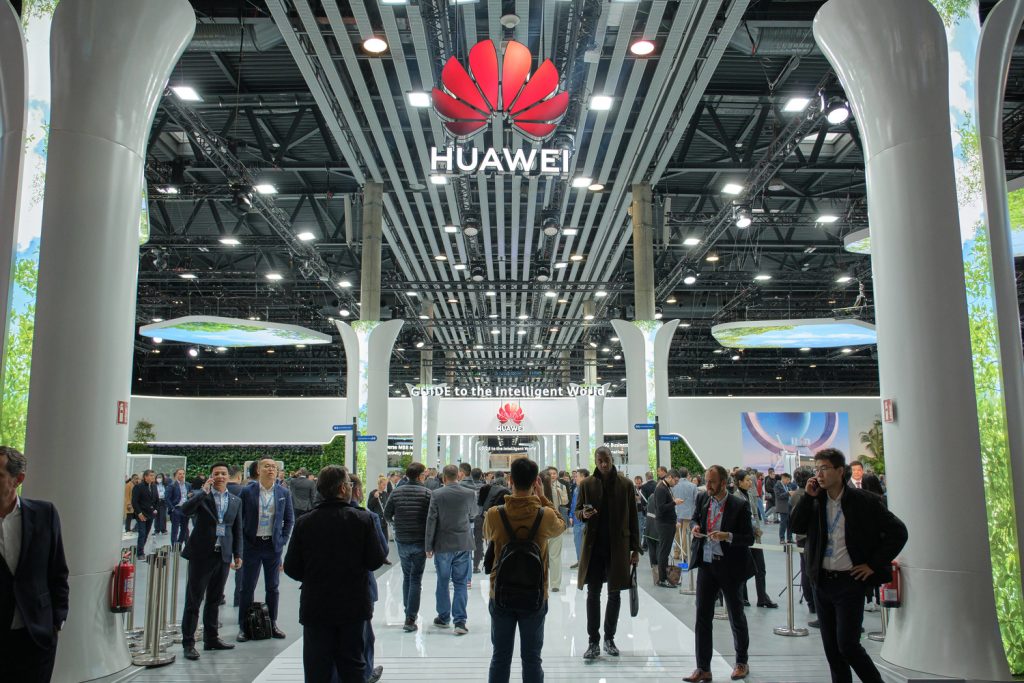
The planned examination of key components from Chinese manufacturers in the German mobile network has been met with a divided response. The Huawei Group, which is at the center of the debate, pointed to an impeccable security track record in a statement to Table.Media. “Huawei has been extremely reliable in delivering technology to Germany and around the world for the past 20 years,” a spokesperson said, adding that there had never been any significant incidents of any kind.
Information emerged on Monday that German Minister of the Interior Nancy Faeser plans to ban components made by Chinese manufacturers from German mobile phone networks. In a letter to the network operators, she apparently announced an extension of the already ongoing tests of the existing network. According to Faeser, Chinese equipment poses a threat to public order and security. The companies may have to pull out electronics that have already been paid for and installed in antenna stations and network nodes.
The telecommunication operators themselves do not see the situation as that simple. Telefónica Germany, which operates the mobile phone network O2, has already spoken of possible claims for damages. Moreover, in the event of a ban on Chinese parts, the company would need enough time to acquire and install new components. Otherwise, the company warns, the quality of the network could suffer. The company has already submitted a list of critical components to the ministry.
Overall, the companies express discontent with the fact that the German government is constantly sending out new signals. “The important thing for us network operators is to get clear and achievable specifications from the relevant authorities and the legislature,” a Telefónica spokesman wrote Table.Media.
In 2019, then-Economy Minister Peter Altmaier was still in favor of cooperation with Huawei. Then came the decision not to exclude Huawei. Only a few months later, however, high hurdles were set for the use of Chinese parts.
The newly elected federal government then made a security audit mandatory last year. Since mid-2022, there has also been a discussion in the government about removing already existing Huawei parts at a later date. So the mood has completely tipped since the Altmaier era.
Now comes the leak about the new review regulation along with the widespread interpretation that Huawei will fail the security test. After all, one trend is clearly visible. Things are getting more and more uncomfortable for the Chinese providers.
The safety audit not only looks at the components and their software code. An important element is also a warranty declaration from the supplier. In addition, the overall political situation also plays a role. Since Russia’s invasion of Ukraine and its far-reaching consequences, this view has many supporters.
Attention is currently focused on the point of mobile radio structures between cellular and distribution networks (RAN). Today’s common standards within “Open RAN” are actually supposed to create more transparency. How each part works is actually clearly visible in Open RAN. At a second glance, it turned out that Open RAN is dominated by China. And the software code of a mobile radio station is so complicated that hardly anyone can discern it later.
On the other hand, an audit of components for the German mobile networks has long been mandated. However, it so far only covers the ground-based core network, which is essential for data traffic to function. Here, no more Chinese parts can be found.
Regulators are also already keeping an eye on the cell phone network. So far, however, the audits have only covered newly installed parts. The minister’s letter, which focuses on components that have already been installed, represents a growing mistrust of the German government toward Huawei and its competitor ZTE.
One reason for the harsher line: The never-ending debates about Huawei had barely any practical impact. To this day, the government is unable to determine exactly how many parts come from China. According to a consultant study, the number of Huawei parts in the German network has increased, not decreased, in recent years.
Huawei itself points out that it has so far received all necessary approvals and certifications in Germany when it has participated in open tendering. It claims that the infrastructure will become particularly secure if many different providers are given access to the market.
From the EU’s perspective, however, domestic providers like Nokia and Ericsson have another major advantage. If they are strong, the dependence on China is reduced in a key sector.
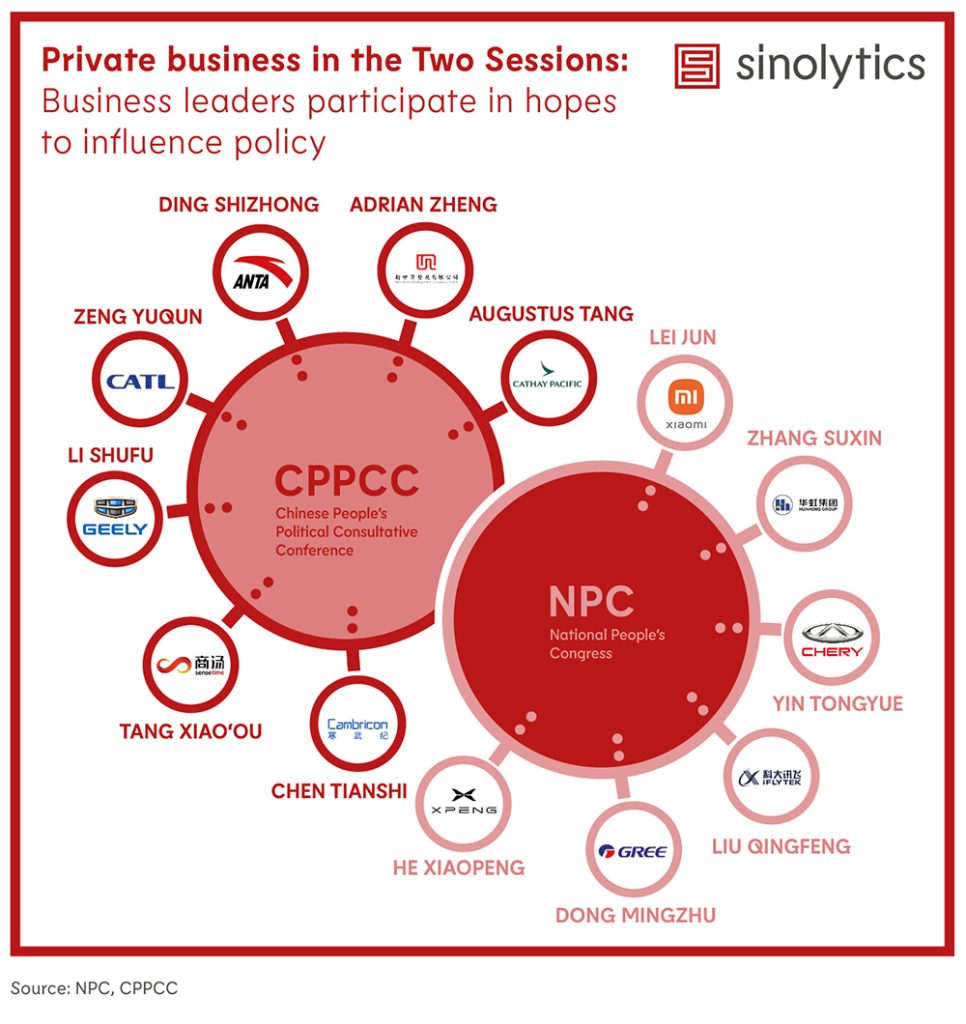
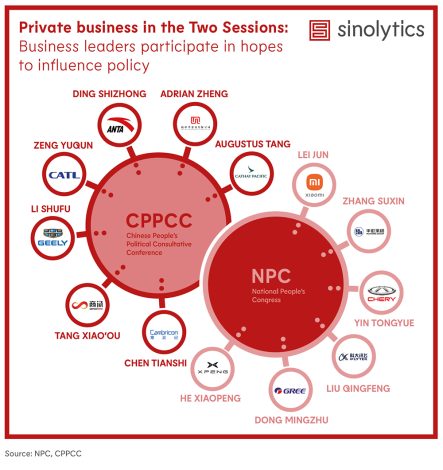
Sinolytics is a European research-based consultancy entirely focused on China. It advises European companies on their strategic orientation and concrete business activities in the People’s Republic.
A proposal for the reorganization of ministries has been presented to the National People’s Congress. It will almost certainly be adopted as is. The new structure envisages:
Once the restructuring is completed, there will be 26 ministry-level authorities. fin
The United Nations Committee on Economic, Social and Cultural Rights (CESCR) is calling on China to immediately abolish its boarding school system in Tibet. The government should “immediately abolish the coerced residential (boarding) school system imposed on Tibetan children” and, in addition, the establishment of private Tibetan schools should be allowed, according to the Committee’s concluding observations at the end of its meeting in Geneva.
The UN body, which meets twice a year, based its conclusions on the accusations made by UN special rapporteurs. The latter criticized the systematic closure of local schools throughout the Tibetan settlement area. The closures have forced Tibetan children to attend boarding schools far away, where they are only allowed to speak Mandarin. As many as 900,000 children are affected. The UN Social Committee fears a cultural assimilation of the Tibetans.
“The recommendations are an indictment against China’s policy in Tibet,” said Kai Mueller, Executive Director of the human rights organization International Campaign for Tibet. The Tibetan people, he said, face policies that systematically threaten the survival of their culture and identity. Mueller calls on the international community to follow the committee’s example and demand an end to these “dramatic rights violations”.
The Committee also expressed concern that Uyghur and Kazakh educational institutions in the Xinjiang Autonomous Region were affected by similar closures. It recommended, “that the State party take all necessary measures to ensure the full and unrestricted enjoyment by peoples and minorities of their right to enjoy fully their own cultural identity and take part in cultural life, and to ensure the use and practice of their language and culture.”
The UN Social Committee had met for three weeks since mid-February and extensively listened to representatives of both the Chinese government and non-governmental organizations. China had sent dozens of delegates to defend itself in the Committee.
In total, the Committee expressed its opinion on the situation in China in 159 paragraphs and made corresponding recommendations in each case. In addition to China’s policy toward minorities, these include deficits in education, equality for women, and the independence of courts and lawyers. The government in Beijing is now called upon to ensure improvements in all the areas criticized and to present the results to the Committee in a future report. grz
Regarding a potential meeting between Taiwan’s President Tsai Ing-wen and the Speaker of the US House of Representatives, Kevin McCarthy, Taiwan has announced that it will not tolerate any “provocations” from China. “If the Chinese communists move again, the armed forces’ job is to fight,” Taiwanese Defense Minister Chiu Kuo-cheng announced Tuesday.
“We will not allow repeated provocations against us. We cannot accept that.” He left open whether that would include resorting to military force. “But we won’t just say ‘bring it on’. We will take a peaceful and rational approach.”
McCarthy reportedly plans to meet with Tsai in California in the coming weeks. This move could initially take the place of the Republican’s expected but politically delicate trip to Taiwan. However, this meeting has not yet been officially confirmed. Taiwan’s Foreign Ministry stated that it would make an announcement in due course about any foreign trips the president might make, but had nothing to announce for now. McCarthy has also not confirmed a meeting with Tsai.
China had stepped up military maneuvers around the island last August in the wake of a visit by then-US House of Representatives Speaker Nancy Pelosi. rtr/flee
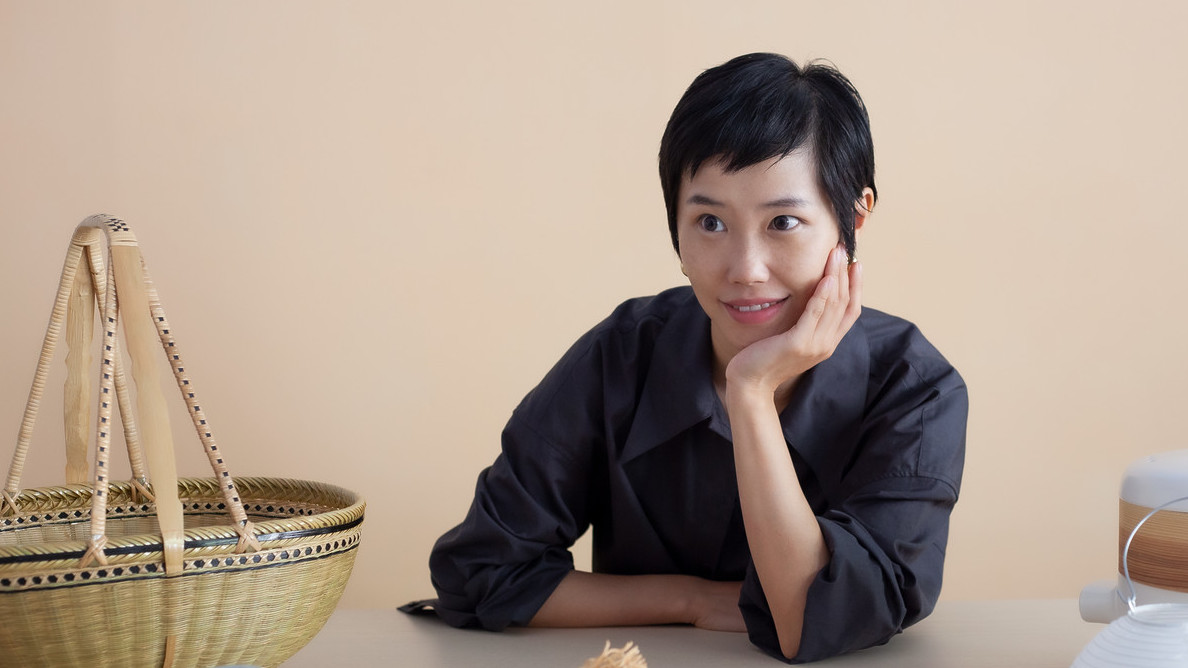
Tao Haiyue describes herself as a curious observer. Before moving to Berlin in 2014, she studied at the Bauhaus University in Weimar. Tao was born in Hangzhou, China. “I grew up in a family of artists; my father is a painter, art editor and publisher,” she says. “And my mother has a passion for calligraphy.” So it was only natural for Tao to enroll in sculpting at Shanghai Normal University after graduating from high school.
Five years later, she moved to Weimar for her master’s degree. “My studies in Germany were a challenging process,” she says looking back. “In the beginning, I had a hard time integrating, and I remained relatively introverted for a while.” But she would not want to miss this experience – because it helped her develop a new perspective on the world and spark new creative processes, she says. This creative process doesn’t follow a set pattern for Tao; she experiments and plays with her observations – but one theme keeps recurring: collective memory. “I explore how groups share, inherit, and construct memories,” Tao reports.
In cities, the artist looks for elements that have collective meaning, such as monuments to Mao Zedong that were once found throughout China. “After the Cultural Revolution, most of the statues were removed, but in some corners of the city, these remnants of the past still stand in public places.”
These forgotten statues inspired Tao to create her artistic intervention “How to be a Monument”. At the entrance to Beijing Agricultural University, she invited people to stand on an empty marble pedestal and imitate the pose of the Mao statue. “In the finished images, they looked like living monuments themselves, raising questions about power structures in public space and the value of individual monuments.”
Tao’s work follows German action artist Joseph Beuys’ idea of seeing society as a collective whole. “As members of society, our actions can have an impact on the whole to varying degrees.” Her artistic actions are meant to speak to people on a deeper level while challenging societal norms. “I always want to bring about positive change,” Tao emphasizes.
That’s why her online shop “Normal Normal,” which she founded in 2021, is not merely a store. She sees it as an experiment in cultural exchange and social progress. The store features beautifully designed everyday objects and designs from Asia that aim to bring the Asian lifestyle and culture into the mainstream. And why the name? “We want to expand the concept of ‘normal’ and challenge the exoticism of cultural artifacts by highlighting the beauty and value of everyday objects from different cultures.” She came up with the idea while walking her cat in the park – also something that could become a new “normal”. Svenja Napp
Li Liu has been the new Senior Manager QMT Powertrain at BMW Brilliance Automotive in Shenyang since the beginning of the year. She previously worked as Project Quality Engineer at BMW Group.
Laura Rosenberger is the new CEO of the American Institute in Taiwan (AIT), effective at the end of March. She succeeds James Moriarty.
Is something changing in your organization? Let us know at heads@table.media!
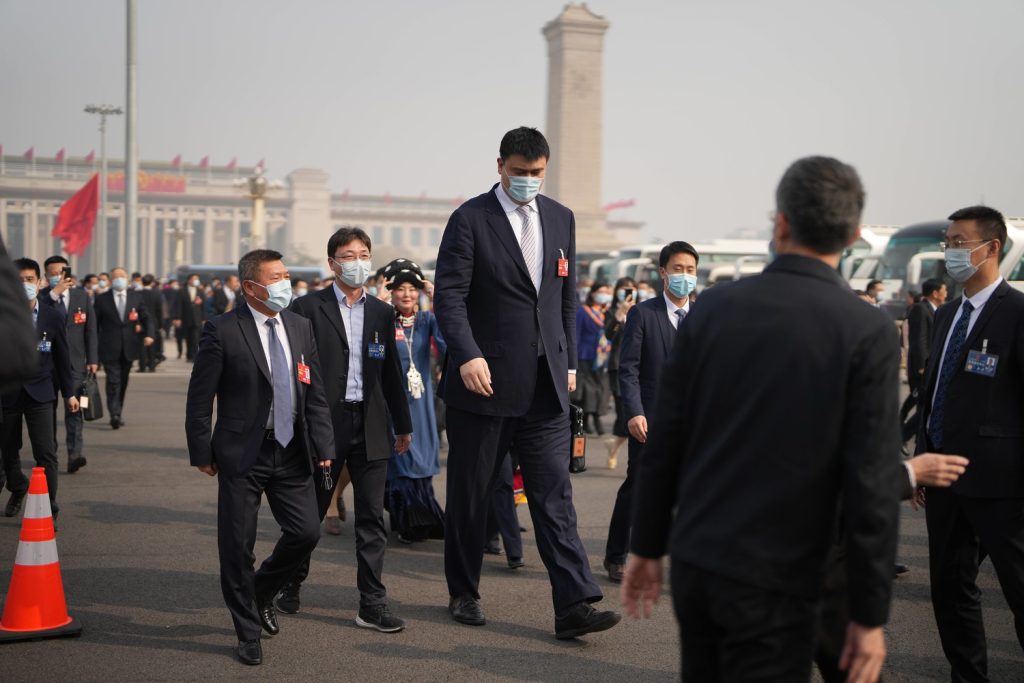
A towering delegate: Chairman of the Chinese Basketball Association and former professional player Yao Ming on his way to the National People’s Congress in Beijing. With his 2.29 meters, Yao Ming is definitely a head-turner, also to other delegates.
At the week-long National People’s Congress, the focus is shifting from one policy area to the next. After economic policy over the weekend, foreign policy came next on Tuesday. Minister Qin Gang was given ample space to present China’s view of things.
Premier Li still expressed soft tones on Sunday. But yesterday, Qin was all the more wolfish. He did not adopt the hoped-for role as a neutral mediator between the two sides in the Ukraine war. For him, Russia is a victim of Western intrigue. He believes that global stability is best helped by closer relations between Moscow and Beijing.
Here the contradictions in China’s goals once again show. The country wants to present itself as a confident broker. In the overall picture of its interests, however, it wants to preserve a strong Russia as a counterweight to the USA and the EU. Therefore, whenever China has taken a step toward Ukraine, it takes a step back toward Russia. Beijing maintains its closeness to Moscow.
On the occasion of the People’s Congress, we asked two of the most distinguished experts on the inner workings of the Chinese Communist Party about the current state of the party. Sophie Reiss from Merics and Marina Rudyak from the University of Goettingen uncover the hidden vulnerabilities of the system in an interview with Michael Radunski.
Today, Huawei responded to the apparently imminent exclusion of Chinese equipment from Germany’s telecommunications networks. The company is urging politicians to remain level-headed. Network operators such as Telekom and Telefónica, in turn, warn that the switch away from the biggest supplier cannot happen overnight.


The Chinese Foreign Minister’s big press conference is a regular date in the calendar of the People’s Congress. It could have been a perfect opportunity for Qin Gang to clarify how exactly China envisages its peace initiative for Ukraine. Not much has been heard since Beijing presented its very vague twelve-point paper on the conflict a good fortnight ago.
But Qin let the opportunity pass. It quickly became clear that he wants to set other accents. He sees the blame for the situation, which he still refuses to call a war, in the EU, the USA and NATO. As every year, the event was meticulously orchestrated, with those present reciting questions that they had to submit and coordinate in advance. So first, a compliant journalist asked how China managed to become such a modern country in such a short time.
The second question asked by a foreign media representative came from the Russian news agency Tass. Could China imagine abandoning the US dollar and the euro when trading with Russia? China would use any currency that was “efficient, secure and credible”, the foreign minister replied meaningfully. He immediately added that relations between the two countries were unshakeable. “The more unstable the world becomes, the more imperative it is for China and Russia to steadily advance their relations,” Qin said.
While he did subsequently call again for peace talks, his appeal demanded that the “legitimate security concerns of all parties should be respected”- a formulation that China usually uses to express support for the Russian position. The conflict, he said, essentially stemmed from problems in the European security architecture. Once again, there was no mention of a Russian invasion.
Qin then devoted a large part of his further remarks to what he saw as the real culprit of the crisis: It was regrettable that the efforts for peace talks were repeatedly undermined. “There seems to be ‘an invisible hand’ pushing for the protraction and escalation of the conflict and using the Ukraine crisis to serve certain geopolitical agenda”. This was a reference to the USA.
At the opening of the People’s Congress on Sunday, outgoing Premier Li Keqiang had been reserved in his comments on foreign policy. But now Qin was all the harsher. If the US continues to speed down the wrong path, “no amount of guardrails can prevent derailing, and there will surely be conflict and confrontation“.
Although Washington would talk about competition, it actually wants to suppress China in all areas, he said. Qin compared relations to an unfair Olympic race: “If one athlete, instead of focusing on giving one’s best, always tries to trip or even injure the other, that is not fair competition, but malicious confrontation and a foul,” said the Chinese foreign minister.
He also urged the US to stop interfering in the Taiwan issue and drew a bizarre comparison: “Why does the US talk at length about respecting sovereignty and territorial integrity on Ukraine, while disrespecting China’s sovereignty and territorial integrity on China’s Taiwan question” he asked. Yet another statement that makes it hard to imagine China being a suitable mediator in the Ukraine war.
In the same breath, Qin rejected US insinuations that his country was providing “lethal assistance” to Russia. China “has not provided weapons to either side of the conflict,” he said. “Why is China being suspected and threatened with sanctions? This is unacceptable!” the foreign minister stressed.

On the grand stage of the National People’s Congress (NPC) in Beijing on Tuesday, Xi Jinping chose to go on the offensive: Western countries, spearheaded by the United States, want to encircle, contain and suppress China, roared China’s President.
The National Congress in China is above all a domestic political event. Even when Xi makes remarks about the US, they are aimed at his own people. Marina Rudyak from the University of Goettingen and Sophie Reiss from China-Thinktank Merics analyzed the internal state of the Communist Party of China.
Rudyak warns of a dangerous situation for China. “What is currently brewing in China is comparable to the period around 1989. The parallels to the events of 1919 or 1989, moments of major escalations in Chinese history, are unmistakable.”
Sophie Reiß also notes that China’s leadership led by Xi is currently faced with significant challenges. “Three years of harsh zero-Covid policies have left deep scars on China, both economically and socially.”
“Overall, the Communist Party has lost massive trust,” the Merics researcher stated.
Sinologist Rudyak believes that the current situation is not only difficult for China’s leadership, but dangerous. In addition to the problems already mentioned, the interim professor at Goettingen University pointed to another phenomenon: “In China, there is a huge youth movement that is deliberately withdrawing from social coexistence.” Under the motto “lying flat,” an entire generation is rejecting to work or participate in social life.
There is also a “Last Generation” movement in China. It has the same name as the movement in Germany, but unlike its counterpart, it does not deal with environmental aspects, but rather with the situation in society as a whole.
These young people ask themselves: Why should I still have children in this system? In a system that restricts us more and more and in which we will be much worse off than our parents? Together with the already high demographic pressure, this movement poses massive problems for the state leadership around Xi Jinping .
Rudyak believes something has gone awry in Chinese society: “The moments when revolts occurred were all economic crises in which youth felt disconnected.” Cautionary examples for Beijing’s leadership include the May 4 movement of 1919 or even the protests in 1989, which were massive economic crises in which urban intellectual youth no longer saw a future for themselves.
China is currently experiencing such a moment again, Rudyak warns. “What is brewing in China right now is not unlike the period around 1989. The parallels to moments in Chinese history when major ruptures occurred are unmistakable.”
Merics researcher Reiss sees this above all as a challenge to the CCP’s legitimacy. “Because the government is not directly elected by the population, its legitimacy is primarily based on economic and social progress. Recently, however, the leadership in Beijing has not been able to do that.”
The unspoken agreement between the people and the CCP – we’ll make sure you get rich, but you’ll stay out of politics – no longer seems to work. “Especially at the local level, the loss of trust in the party is already very high,” says Reiss.
Rudyak fears that domestic problems could lead to a more aggressive foreign policy. “Already, the rhetoric toward the US is getting harsher. Beijing claims that the international environment, and especially the US, is to blame for China’s economic woes.”
The announced growth target of five percent must also be seen in this context, she said. “This figure is a clear signal to the population. The Covid crisis is over. The domestic causes of the economic crisis have been eliminated. We are ready.”
With the National People’s Congress, China’s leadership addresses its own people. This year, the message is: Despite the Covid crisis, despite the trade war and despite the suppression by the USA, China has so far managed to achieve unprecedented successes. Beijing knows the guarantor of success: The Communist Party leadership around Xi Jinping.

The planned examination of key components from Chinese manufacturers in the German mobile network has been met with a divided response. The Huawei Group, which is at the center of the debate, pointed to an impeccable security track record in a statement to Table.Media. “Huawei has been extremely reliable in delivering technology to Germany and around the world for the past 20 years,” a spokesperson said, adding that there had never been any significant incidents of any kind.
Information emerged on Monday that German Minister of the Interior Nancy Faeser plans to ban components made by Chinese manufacturers from German mobile phone networks. In a letter to the network operators, she apparently announced an extension of the already ongoing tests of the existing network. According to Faeser, Chinese equipment poses a threat to public order and security. The companies may have to pull out electronics that have already been paid for and installed in antenna stations and network nodes.
The telecommunication operators themselves do not see the situation as that simple. Telefónica Germany, which operates the mobile phone network O2, has already spoken of possible claims for damages. Moreover, in the event of a ban on Chinese parts, the company would need enough time to acquire and install new components. Otherwise, the company warns, the quality of the network could suffer. The company has already submitted a list of critical components to the ministry.
Overall, the companies express discontent with the fact that the German government is constantly sending out new signals. “The important thing for us network operators is to get clear and achievable specifications from the relevant authorities and the legislature,” a Telefónica spokesman wrote Table.Media.
In 2019, then-Economy Minister Peter Altmaier was still in favor of cooperation with Huawei. Then came the decision not to exclude Huawei. Only a few months later, however, high hurdles were set for the use of Chinese parts.
The newly elected federal government then made a security audit mandatory last year. Since mid-2022, there has also been a discussion in the government about removing already existing Huawei parts at a later date. So the mood has completely tipped since the Altmaier era.
Now comes the leak about the new review regulation along with the widespread interpretation that Huawei will fail the security test. After all, one trend is clearly visible. Things are getting more and more uncomfortable for the Chinese providers.
The safety audit not only looks at the components and their software code. An important element is also a warranty declaration from the supplier. In addition, the overall political situation also plays a role. Since Russia’s invasion of Ukraine and its far-reaching consequences, this view has many supporters.
Attention is currently focused on the point of mobile radio structures between cellular and distribution networks (RAN). Today’s common standards within “Open RAN” are actually supposed to create more transparency. How each part works is actually clearly visible in Open RAN. At a second glance, it turned out that Open RAN is dominated by China. And the software code of a mobile radio station is so complicated that hardly anyone can discern it later.
On the other hand, an audit of components for the German mobile networks has long been mandated. However, it so far only covers the ground-based core network, which is essential for data traffic to function. Here, no more Chinese parts can be found.
Regulators are also already keeping an eye on the cell phone network. So far, however, the audits have only covered newly installed parts. The minister’s letter, which focuses on components that have already been installed, represents a growing mistrust of the German government toward Huawei and its competitor ZTE.
One reason for the harsher line: The never-ending debates about Huawei had barely any practical impact. To this day, the government is unable to determine exactly how many parts come from China. According to a consultant study, the number of Huawei parts in the German network has increased, not decreased, in recent years.
Huawei itself points out that it has so far received all necessary approvals and certifications in Germany when it has participated in open tendering. It claims that the infrastructure will become particularly secure if many different providers are given access to the market.
From the EU’s perspective, however, domestic providers like Nokia and Ericsson have another major advantage. If they are strong, the dependence on China is reduced in a key sector.


Sinolytics is a European research-based consultancy entirely focused on China. It advises European companies on their strategic orientation and concrete business activities in the People’s Republic.
A proposal for the reorganization of ministries has been presented to the National People’s Congress. It will almost certainly be adopted as is. The new structure envisages:
Once the restructuring is completed, there will be 26 ministry-level authorities. fin
The United Nations Committee on Economic, Social and Cultural Rights (CESCR) is calling on China to immediately abolish its boarding school system in Tibet. The government should “immediately abolish the coerced residential (boarding) school system imposed on Tibetan children” and, in addition, the establishment of private Tibetan schools should be allowed, according to the Committee’s concluding observations at the end of its meeting in Geneva.
The UN body, which meets twice a year, based its conclusions on the accusations made by UN special rapporteurs. The latter criticized the systematic closure of local schools throughout the Tibetan settlement area. The closures have forced Tibetan children to attend boarding schools far away, where they are only allowed to speak Mandarin. As many as 900,000 children are affected. The UN Social Committee fears a cultural assimilation of the Tibetans.
“The recommendations are an indictment against China’s policy in Tibet,” said Kai Mueller, Executive Director of the human rights organization International Campaign for Tibet. The Tibetan people, he said, face policies that systematically threaten the survival of their culture and identity. Mueller calls on the international community to follow the committee’s example and demand an end to these “dramatic rights violations”.
The Committee also expressed concern that Uyghur and Kazakh educational institutions in the Xinjiang Autonomous Region were affected by similar closures. It recommended, “that the State party take all necessary measures to ensure the full and unrestricted enjoyment by peoples and minorities of their right to enjoy fully their own cultural identity and take part in cultural life, and to ensure the use and practice of their language and culture.”
The UN Social Committee had met for three weeks since mid-February and extensively listened to representatives of both the Chinese government and non-governmental organizations. China had sent dozens of delegates to defend itself in the Committee.
In total, the Committee expressed its opinion on the situation in China in 159 paragraphs and made corresponding recommendations in each case. In addition to China’s policy toward minorities, these include deficits in education, equality for women, and the independence of courts and lawyers. The government in Beijing is now called upon to ensure improvements in all the areas criticized and to present the results to the Committee in a future report. grz
Regarding a potential meeting between Taiwan’s President Tsai Ing-wen and the Speaker of the US House of Representatives, Kevin McCarthy, Taiwan has announced that it will not tolerate any “provocations” from China. “If the Chinese communists move again, the armed forces’ job is to fight,” Taiwanese Defense Minister Chiu Kuo-cheng announced Tuesday.
“We will not allow repeated provocations against us. We cannot accept that.” He left open whether that would include resorting to military force. “But we won’t just say ‘bring it on’. We will take a peaceful and rational approach.”
McCarthy reportedly plans to meet with Tsai in California in the coming weeks. This move could initially take the place of the Republican’s expected but politically delicate trip to Taiwan. However, this meeting has not yet been officially confirmed. Taiwan’s Foreign Ministry stated that it would make an announcement in due course about any foreign trips the president might make, but had nothing to announce for now. McCarthy has also not confirmed a meeting with Tsai.
China had stepped up military maneuvers around the island last August in the wake of a visit by then-US House of Representatives Speaker Nancy Pelosi. rtr/flee

Tao Haiyue describes herself as a curious observer. Before moving to Berlin in 2014, she studied at the Bauhaus University in Weimar. Tao was born in Hangzhou, China. “I grew up in a family of artists; my father is a painter, art editor and publisher,” she says. “And my mother has a passion for calligraphy.” So it was only natural for Tao to enroll in sculpting at Shanghai Normal University after graduating from high school.
Five years later, she moved to Weimar for her master’s degree. “My studies in Germany were a challenging process,” she says looking back. “In the beginning, I had a hard time integrating, and I remained relatively introverted for a while.” But she would not want to miss this experience – because it helped her develop a new perspective on the world and spark new creative processes, she says. This creative process doesn’t follow a set pattern for Tao; she experiments and plays with her observations – but one theme keeps recurring: collective memory. “I explore how groups share, inherit, and construct memories,” Tao reports.
In cities, the artist looks for elements that have collective meaning, such as monuments to Mao Zedong that were once found throughout China. “After the Cultural Revolution, most of the statues were removed, but in some corners of the city, these remnants of the past still stand in public places.”
These forgotten statues inspired Tao to create her artistic intervention “How to be a Monument”. At the entrance to Beijing Agricultural University, she invited people to stand on an empty marble pedestal and imitate the pose of the Mao statue. “In the finished images, they looked like living monuments themselves, raising questions about power structures in public space and the value of individual monuments.”
Tao’s work follows German action artist Joseph Beuys’ idea of seeing society as a collective whole. “As members of society, our actions can have an impact on the whole to varying degrees.” Her artistic actions are meant to speak to people on a deeper level while challenging societal norms. “I always want to bring about positive change,” Tao emphasizes.
That’s why her online shop “Normal Normal,” which she founded in 2021, is not merely a store. She sees it as an experiment in cultural exchange and social progress. The store features beautifully designed everyday objects and designs from Asia that aim to bring the Asian lifestyle and culture into the mainstream. And why the name? “We want to expand the concept of ‘normal’ and challenge the exoticism of cultural artifacts by highlighting the beauty and value of everyday objects from different cultures.” She came up with the idea while walking her cat in the park – also something that could become a new “normal”. Svenja Napp
Li Liu has been the new Senior Manager QMT Powertrain at BMW Brilliance Automotive in Shenyang since the beginning of the year. She previously worked as Project Quality Engineer at BMW Group.
Laura Rosenberger is the new CEO of the American Institute in Taiwan (AIT), effective at the end of March. She succeeds James Moriarty.
Is something changing in your organization? Let us know at heads@table.media!

A towering delegate: Chairman of the Chinese Basketball Association and former professional player Yao Ming on his way to the National People’s Congress in Beijing. With his 2.29 meters, Yao Ming is definitely a head-turner, also to other delegates.
